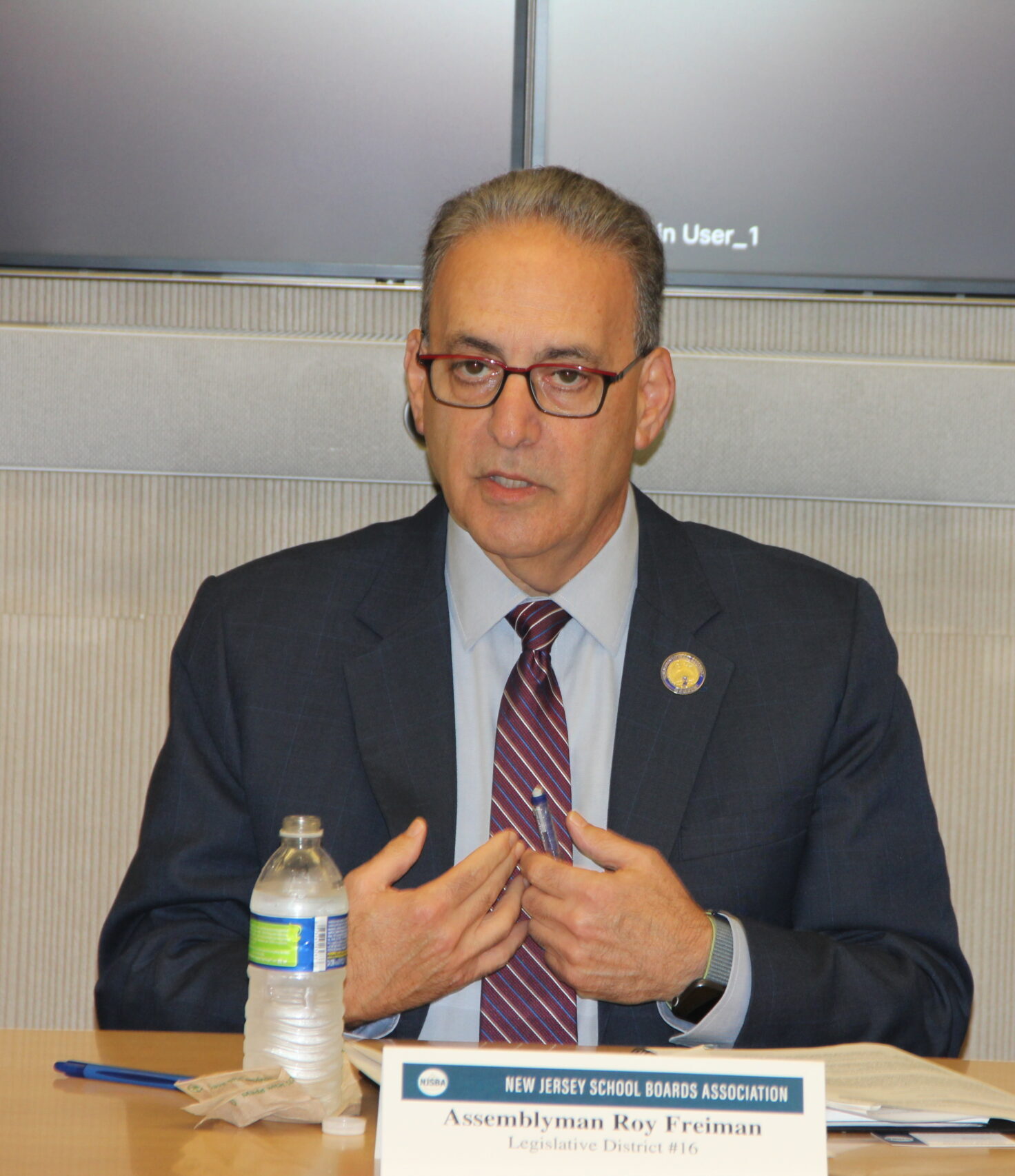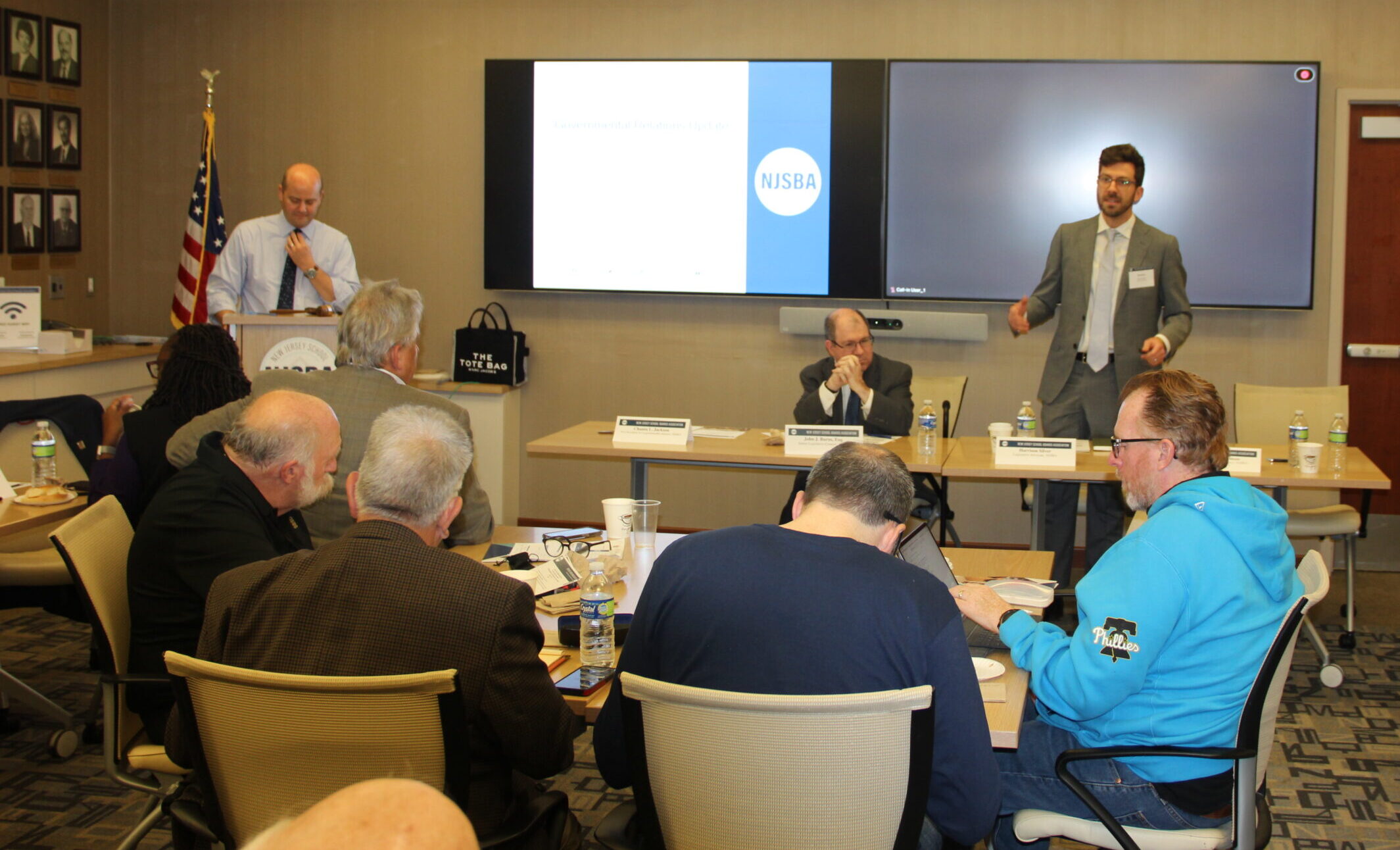Board members throughout the state tackled an array of business items at the New Jersey School Boards Association’s Legislative Committee Meeting on Oct. 5. They heard from two guest speakers: Assemblyman Roy Freiman and Assemblywoman Mitchelle Drulis, both from Legislative District 16.
Dr. Timothy Purnell, executive director and CEO of the Association, thanked attendees for spending their Saturday morning to advance the education of all children.
He also introduced one of the Association’s newest employees, Harrison Silver, who has joined the Governmental Relations team as legislative advocate.
Karen Cortellino, M.D., president of the NJSBA, extended her greetings and thanks to board members for attending the meeting, which was held at the Association’s headquarters in Trenton.
Ray Pinney, chief membership engagement officer at the Association, welcomed new members of the Legislative Committee, who received a round of applause from the group.
Jonathan Pushman, senior director of advocacy at NJSBA, said the Association remains committed to holding some Legislative Committee meetings in person, observing that something was lost during the pandemic when meetings were fully virtual. “There is so much here in terms of the knowledge and experience you all have as board members, and it is really important that we are able to talk to one another,” he said.
Chanta L. Jackson, vice president for legislation/resolutions, kept the meeting running on schedule and introduced the two legislators.
Freiman, a Democrat and the Assembly’s deputy majority leader, is chair of the Financial Institutions and Insurance Committee, vice chair of the Oversight, Reform and Federal Relations Committee and also a member of the Budget Committee. He has represented the 16th Legislative District since 2018. A Hillsborough resident of more than 20 years, he was an executive at Prudential Financial before joining the Assembly.
Freiman told attendees that the first time he ran for office is for the one he currently holds, emphasizing that he was not involved in party politics. He was, however, frustrated by what he saw as an unwillingness to tackle important issues.
“The work you do matters so much to the local community,” he said, noting that the first question that people ask when they are weighing whether to move into a community is, “How are the schools? They don’t ask about the Township Committee.”
During the meeting, there was lots of talk about the school funding formula, which Freiman said is outdated. While it was enacted with good intentions, he observed it involved “a lot of good people getting around the table, trying to predict what would happen.”
Pushman dug for more insights into Freiman’s views of school funding, asking him to share details of how he orchestrated A-4161, which established the Stabilized School Budget Aid Grant Program to restore certain portions of state school aid reductions and permitted certain school districts to exceed the tax levy growth limitation in the 2024-2025 school year. Both he and Drulis were primary sponsors of the bill.
While the formula says certain school districts must contribute more of their “local fair share,” the process has not been allowed to work out as a result of the property tax levy cap, Freiman said.
As for the bill that provided some relief to school districts, it came about as a result of parents, educators and students all testifying about the severity of cuts, which were not a result of school boards being mismanaged, he said. The math does not discriminate based on political affiliation, which helped legislators build a coalition to act, he said.
Providing a predictable outlook on funding for school districts is critical, he said. “Let’s agree that offering multi-year predictability with some confidence is what we are trying to work toward,” he said.
In a bid to try to provide some of that continuity, Freiman is the prime sponsor of A-942, which would require a five-year average of equalized property valuation be used in calculation of local share under the State school funding formula. Drulis is a co-sponsor of the bill.
Jackson also introduced Drulis, who is a member of the Labor Committee, the Public Safety and Preparedness Committee and the State and Local Government Committee.
No stranger to New Jersey politics, she began her career as a legislative aide to Assemblyman Bob Smith in December 2000 before serving as the chief of staff to Assemblyman Joe Egan from 2002 to 2013. She went on to serve as the political director for then candidate Tom Malinowski in the 2018 midterms, who was elected to the U.S. House of Representatives. She served as district director for his office and was elected to New Jersey’s Assembly in 2023.
“I absolutely love working in government and helping people,” she said. She referenced her prior positions and said that while they were jobs, they also provided her with an education.
Commenting on the funding formula, she noted that she was attending her first budget address when she heard Gov. Phil Murphy say that the formula would be fully funded for the first time. She then learned about the nuances of that statement, including the fact that some districts have lost funding.
Next, she talked about being the prime sponsor of bill A-3446, more commonly referred to as the Freedom to Read Act. The bill provides a structured, transparent process for parents to challenge materials they may find inappropriate. The final decision of whether to include or eliminate resources, however, would be made by the local board of education, which would have policies in place for the curation of library materials. The bill has passed in the Assembly and Drulis is hopeful that it will make its way to the governor for his signature.
Attendees were given the chance to ask questions of the legislators, who covered a wide range of topics, including their thoughts on expanding access to school meals, school regionalization, funding special education, the teacher shortage and more.
Governmental Relations Update
The Association’s Governmental Relations Team, which includes Pushman, Silver and John Burns, senior legislative counsel, spent the rest of the meeting highlighting recent school-related enactments and noteworthy bills on the move.
Topics included:
- Key highlights from the state’s fiscal year 2025 budget.
- Findings from the Educator Evaluation Review Task Force. (See the recent article in School Board Notes.)
- Improving student literacy. (S-2644/A-4303, P.L 2024, c.52. as well as A2288/S2647, P.L.2024, c.53.)
- Open Public Records Act reform, which was signed into law June 5.
- The expansion of the Alliance for Competitive Energy Services to include the procurement of electric school buses. (A-1677/S-3263, P.L. 2024, c.38.)
- Second questions at special elections (A-4084/S-2837, P.L. 2024, c.60.)
- Eliminating the requirement for candidates for instructional certificates to complete a New Jersey Department of Education approved test of basic reading, writing and mathematics skills (i.e. Praxis Core). (A-1699/S-1287, P.L. 2024, c. 26.)
Numerous other bills that have been the subject of extensive write-ups in recent editions of School Board Notes were also addressed.
The Governmental Relations team also invited attendees to join them for the Legislative Panel that will be part of Workshop 2024 in Atlantic City. The session will be 10:30 a.m. on Wednesday, Oct. 23.
Panelists will include:
- Sen. Vin Gopal (D-11), Senate Education Committee, chair.
- Sen. M. Teresa Ruiz (D-29), Senate Majority Leader.
- Sen. Jon Bramnick (R-21).
- Assemblyman Erik Simonsen (R-1), Assembly Education Committee, member.
To view the full text of any of the bills summarized above, please visit the New Jersey Legislature’s website.











